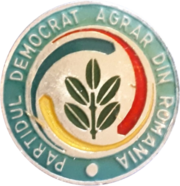Democratic Agrarian Party of Romania
The Democratic Agrarian Party of Romania (Romanian: Partidul Democrat Agrar din România, PDAR) was a political party in Romania.
Democratic Agrarian Party of Romania Partidul Democrat Agrar din România | |
|---|---|
 | |
| Abbreviation | PDAR |
| Leader | Mihai Berca |
| Founder | Victor Surdu |
| Founded | 29 January 1990 |
| Dissolved | 14 March 1998 |
| Merged into | Romanian National Party |
| Ideology | Agrarianism (Ruralism) Romanian nationalism[1][2] |
| Political position | Centre to centre-left |
| National affiliation | Red Pentagon[3][4][5][6][7] (1992-1994)[8] National Union of the Centre (1996) |
History
editThe PDAR was formed on 29 January 1990 as a competitor to the Christian Democratic National Peasants' Party (PNȚCD). In the transitional government led by Petre Roman, PDAR member Nicolae Ștefan was Minister of Agriculture. The party received 1.8% of the Chamber of Deputies vote in the 1990 general elections, winning nine seats.[9] It also received 1.6% of the vote in the Senate elections, but failed to win a seat.[10]
Despite increasing its Chamber vote share in the 1992 general elections to 3%, it failed to win a seat.[11] However, it won five seats in the Senate with 3.3% of the vote.[12] It contested the 1996 elections as part of the National Union of the Centre alliance, alongside the Ecological Movement of Romania (MER) and the Humanist Party (PC). However, the alliance received only 0.9% of the vote, failing to win a seat.[13] In 1998, the PDAR merged with the New Romania Party to form the Romanian National Party.
Election results
editParliament
edit| Election | Chamber | Senate | Position | Aftermath | ||||
|---|---|---|---|---|---|---|---|---|
| Votes | % | Seats | Votes | % | Seats | |||
| 1990 | 250,403 | 1.83 | 9 / 395 |
221,790 | 1.59 | 0 / 119 |
7th | Supported the FSN government (1990–1991) |
| FSN–PNL–MER–PDAR government (1991–1992) | ||||||||
| 1992 | 322,990 | 2.99 | 0 / 341 |
359,042 | 3.25 | 5 / 143 |
7th | Supported the PDSR–PUNR–PRM–PSM government |
| 1996 | Part of the National Union of the Centre |
0 / 341 |
Part of the National Union of the Centre |
0 / 143 |
16th | Extraparliamentary | ||
References
edit- ^ http://www.regione.toscana.it/documents/10180/452241/partiti%20elezioni%20-%20Q50/9bd72f76-8f3b-4cd5-9931-5deeb1fc3154 [bare URL]
- ^ Lansford, Tom; Muller, Tom (2 April 2012). Political Handbook of the World 2012. ISBN 978-1-60871-995-2.
- ^ "Povestea unei fotografii. Corneliu Coposu nu este lăsat să ajungă la microfonul Parlamentul". 11 April 2018.
- ^ "De ce au eșuat coalițiile postcomuniste (II) Temele nepregătite și lecțiile neînvățate". 11 August 2022.
- ^ Ion Cristoiu (14 May 2009). "Tradiţia Coaliţiilor de scandal". Jurnalul Național (in Romanian).
- ^ Radu Borcea (3 June 2016). "România se întoarce la guvernarea cu partide-balama". Adevărul (in Romanian).
- ^ Petru Clej (7 October 2021). "Guvern minoritar – un caz de excepție, care se înscrie în regulile democrației. Exemple din România și din alte țări". G4 Media (in Romanian).
- ^ Lansford, Tom; Muller, Tom (2 April 2012). Political Handbook of the World 2012. ISBN 978-1-60871-995-2.
- ^ Dieter Nohlen & Philip Stöver (2010) Elections in Europe: A data handbook, p1599 ISBN 978-3-8329-5609-7
- ^ 1990 Parliamentary Elections: Senate Archived 2012-02-05 at the Wayback Machine University of Essex
- ^ 1992 Parliamentary Elections: Chamber of Deputies Archived 2003-01-07 at the Wayback Machine University of Essex
- ^ Nohlen & Stöver, pp1607–1613
- ^ 1996 Parliamentary Elections: Chamber of Deputies Archived 2011-06-14 at the Wayback Machine University of Essex